November 26, 2025 | 18:52 GMT +7
November 26, 2025 | 18:52 GMT +7
Hotline: 0913.378.918
November 26, 2025 | 18:52 GMT +7
Hotline: 0913.378.918
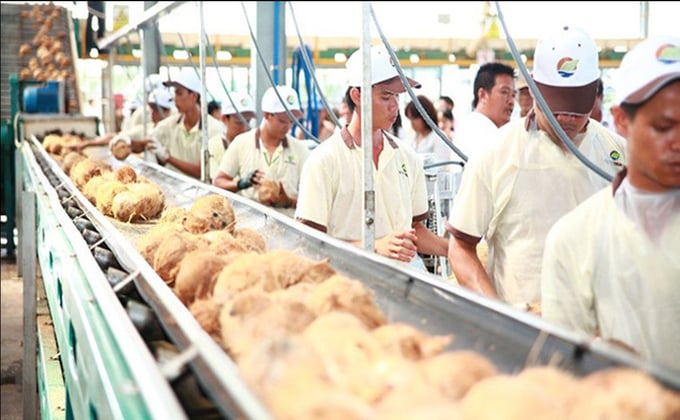
Coconut has become a potential export product with an expected turnover of over 1 billion USD this year. Photo: Minh Dam.
The Department of International Cooperation (MARD) has recently reported that Vietnam's coconut industry has experienced substantial growth. It is not only a source of income for hundreds of thousands of agricultural households, but it is also becoming a potential export product, with an anticipated export revenue of over USD 1 billion this year.
At present, there are 25 provinces and localities in the country that have specialized coconut plantations, which span nearly 200,000 hectares. Of this area, approximately 80% is in productive use.
Vietnam's coconut industry is not only a promising agricultural sector, but also an ideal paradigm for the development of a circular economy and the mitigation of climate change. The coconut tree's entire composition, including the trunk, leaves, and fruit, as well as the husk and coir, can be repurposed to generate new value, mitigate resource waste, and decrease greenhouse gas emissions.
Furthermore, the cultivation of coconuts is an effective agricultural solution to mitigate the increasingly severe impacts of climate change due to its strong arid tolerance and adaptability.

Mr. Nicolas, representative of FDI enterprise (Dutch capital, headquartered in Can Tho City) looking for investment opportunities. Photo: Minh Dam.
From the Department of International Cooperation, Nguyen Thi Linh underscored that the coconut industry is a multi-value integrated model that completely embodies the principles of circular agriculture. The coconut industry's development is not merely an investment in production and trade; it also contributes to a sustainable way of life.
"The coconut tree, from its flowers, leaves, and fruit—including the coir, kernel, and shell—provides products essential for food security and serves as raw materials for the cosmetic, medical, and textile industries." Nevertheless, the energy derivatives from coconuts, including biofuel and activated carbon, are the most valuable components, according to Linh.
Additionally, she observed that only 179 countries are presently capable of exporting coconut products, although 225 countries worldwide have a demand for them. Only five to six countries, including the Philippines, Indonesia, Malaysia, Vietnam, and the Netherlands, account for more than 90% of global export volumes. This emphasizes the substantial potential of Vietnam's coconut refining and export industry.
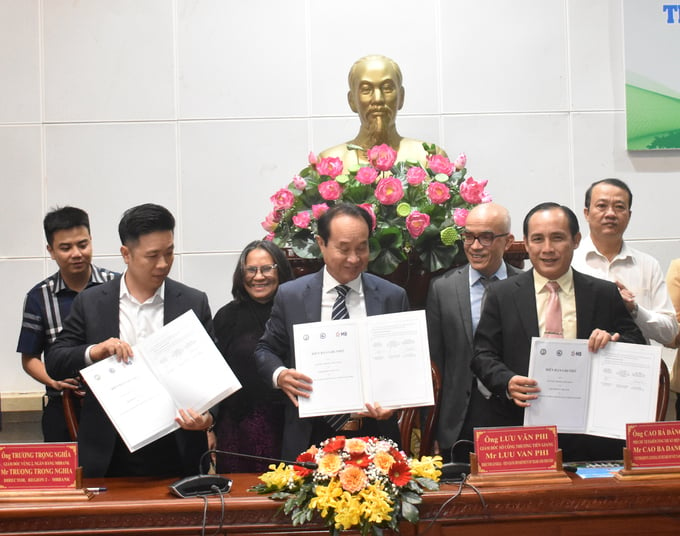
At the conference, a signing ceremony of a cooperation MOU was held between representatives of Tien Giang province, the Vietnam Coconut Association and the Military Bank (MBBank). Photo: Minh Dam.
Vietnam's coconut industry is still facing a variety of obstacles, such as the development of its brand, the establishment of sustainable value chains, the enhancement of infrastructure in raw material regions, and the investment in deep processing, despite the substantial opportunities. These aspects necessitate strategic orientation and methodical investment to guarantee that the industry does not remain confined to the export of raw materials, but rather develops into a producer of high-value-added products that can compete in international markets.
The forum was a significant milestone in the recognition of the coconut industry's immense potential and the discussion of practical remedies to address these obstacles. The objective is to contribute to the circular economy, a global trend, by transforming Vietnam's coconut industry into a sustainable, multi-value sector, in addition to increasing exports.
Tran Thi Hon, Director of Ngoc Tra International Trading Export Co., Ltd., located in Binh Duc Commune, Chau Thanh District, Tien Giang Province, participated in the forum to find out about potential export opportunities for coconuts. She stated, "I would enjoy participating in this forum to identify export markets and elevate our coconuts to a global scale." The current state of our business is characterized by substantial challenges in the procurement of raw materials, as a result of the high cost of coconuts and the low sellable prices. Additionally, basic materials are scarce for cluster coconuts; however, prices have not increased. I aspire to establish relationships with households and cooperatives to stabilize the prices of raw materials, thereby facilitating more consistent exports in the future."
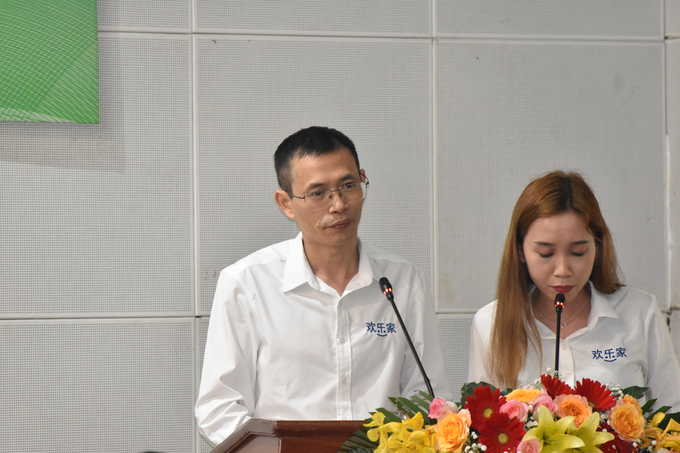
Mr. Zhou Tusheng, General Director of HLJ Industrial Company, said that they are facing difficulties in raw coconut prices and some difficulties related to purchasing in Vietnam. Photo: Minh Dam.
Mr. Zhou Tusheng, the General Director of HLJ Industrial in Guangdong, China, disclosed that his organization maintains four coconut processing factories in Guangdong, Hubei, and Shandong. These factories have a daily processing capacity of 500-700 tons of raw coconuts. The company is actively seeking opportunities to invest in the production of coconut water, frozen coconut milk, dried coconut flesh, and activated carbon from coconut shells.
Nevertheless, Zhou acknowledged the challenges associated with the buying and pricing of raw materials in Vietnam. He expressed his optimism that local authorities and relevant sectors would provide assistance to farmers in the establishment of a stable raw material region.
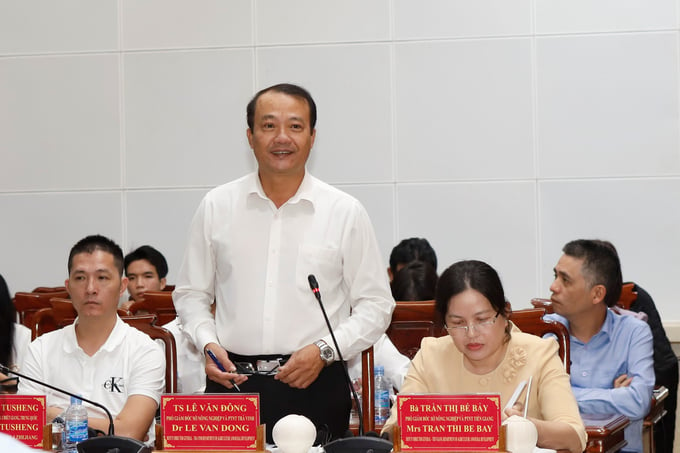
Mr. Le Van Dong, Deputy Director of Tra Vinh Department of Agriculture and Rural Development, shared at the Forum. Photo: Minh Dam.
Participants at the forum deliberated on a variety of policies and solutions to advance the coconut industry, to foster sustainable growth strategies, attract foreign investment, and promote exports. In addition, attendees facilitated connections between domestic and international partners by sharing initiatives, experiences, and successful models in the development of the coconut value chain, from primary material regions to processing and export.
Mr. Le Van Dong, the Deputy Director of the Department of Agriculture and Rural Development of Tra Vinh Province, observed that Tra Vinh is the second-largest coconut-growing region in Vietnam, with an estimated 28,000 hectares. This area includes 6,000 hectares of organic coconuts and 10 plantation codes that are eligible for export to China.
He underscored that the province places a high priority on the development of fresh coconut and industrially processed coconut products, as well as the diversification and concentration on key products. Furthermore, Tra Vinh advocates for policies that encourage investment through the implementation of central regulations and provincial incentives.
The MARD proposed nine critical solutions, which include the following: collaborating with research institutions to transfer scientific and technical knowledge, promoting trade and market expansion, organizing training on science and pest control measures, developing irrigation and transportation systems for goods transfer, proposing supportive policies, and strengthening state management.
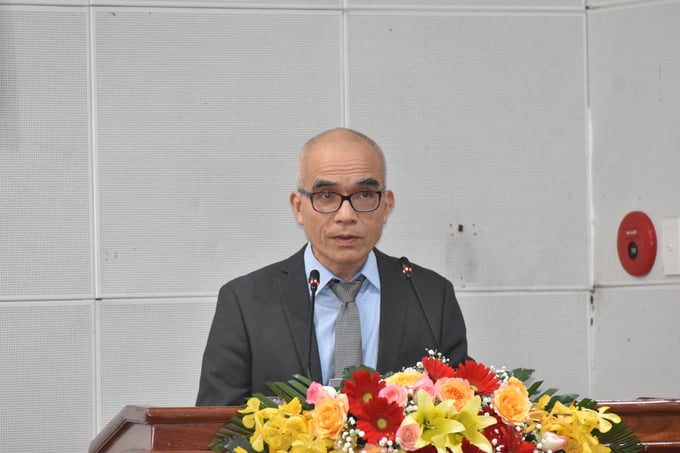
Mr. To Viet Chau, Deputy Director of the Department of International Cooperation (Ministry of Agriculture and Rural Development) delivered a concluding speech at the Forum. Photo: Minh Dam.
A representative from an FDI enterprise with Dutch capital based in Can Tho, Nicolas, provided an overview of the company's intentions for the development of organic coconut products in Vietnam. He underscored the significance of basic materials that are both stable and of high quality, with a particular emphasis on those that are GAP-certified.
Mr. Nicolas also emphasized the necessity of investing in scientific and technological applications, such as the development of coconut varieties that are drought-resistant, as well as the mitigation of salinity and parasites. Additionally, he emphasized the importance of fostering human capital to assist the coconut industry.
The Ministry of Agriculture and Rural Development will work in conjunction with localities, enterprises, associations, and international partners to implement measures to enhance investment support policies, according to Mr. To Viet Chau, Deputy Director of the Department of International Cooperation, in his concluding remarks.
The Ministry will also facilitate the development of infrastructure and the establishment of supply chain connections to improve the production and export chain of coconut products. Its objective is to support enterprises and localities in the development of brands, the expansion of markets, and the sustainable and effective growth of Vietnam's coconut industry.
Translated by Linh Linh

(VAN) The Disaster Prevention Community Fund has mobilized resources to install automatic rain gauge and flood warning stations, helping localities proactively respond to natural disasters more effectively.

(VAN) Thanh Hoa province has substantial potential to supply carbon credits, opening opportunities for green economic development, enhancing agriculture and forestry value.
/2025/11/25/1741-0-nongnghiep-221736.jpg)
(VAN) The application of AI helps identify emission sources and assess air pollution developments, thereby supporting management agencies in issuing timely and appropriate control policies.

(VAN) Viet Nam will develop its carbon market not only by prioritizing transaction volumes but also by transitioning to a low-emission economy.
/2025/11/25/3413-1-171953_261.jpg)
(VAN) Experts from the Vietnam Academy of Science and Technology have conducted surveys to identify the causes of landslides in Lam Dong province and propose natural disaster prevention solutions.

(VAN) The HNT reservoir operation support system, developed by WeatherPlus in collaboration with Kyushu Electric Power, enables real-time rainfall forecasting, inflow forecasting, and flood-release simulations.

(VAN) Dr. Cao Duc Phat stated that the localization of early natural disaster warning technologies will help meet practical requirements and create favorable conditions for domestic research institutions and businesses to develop.